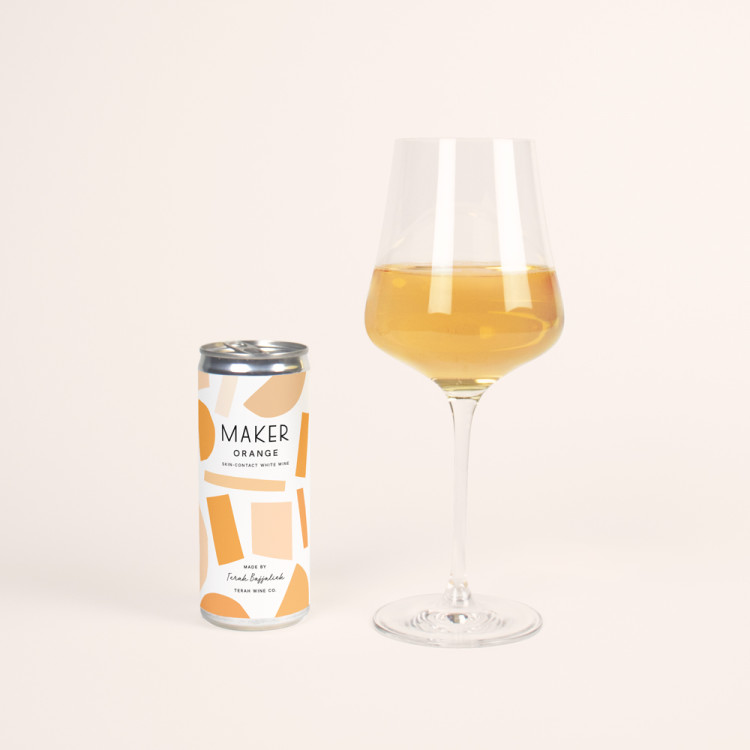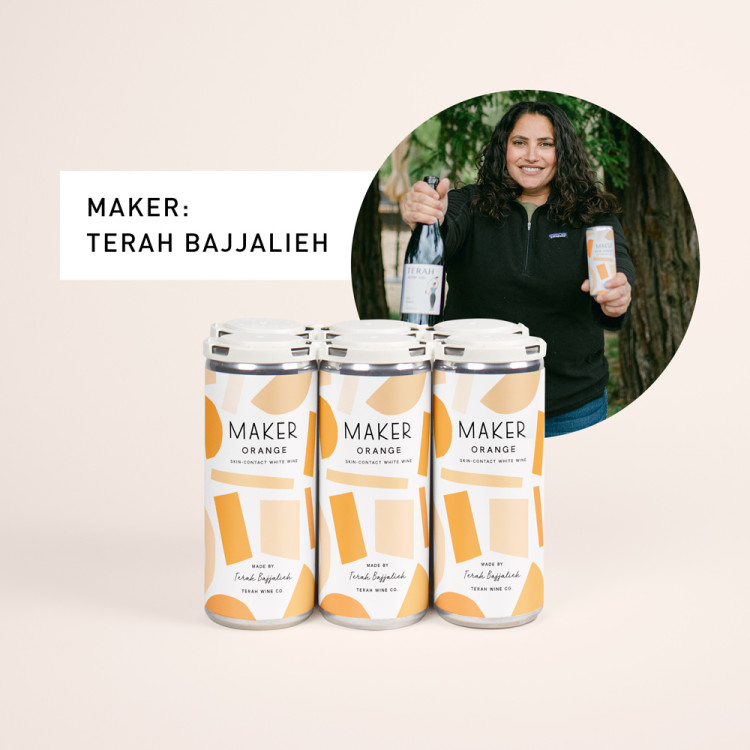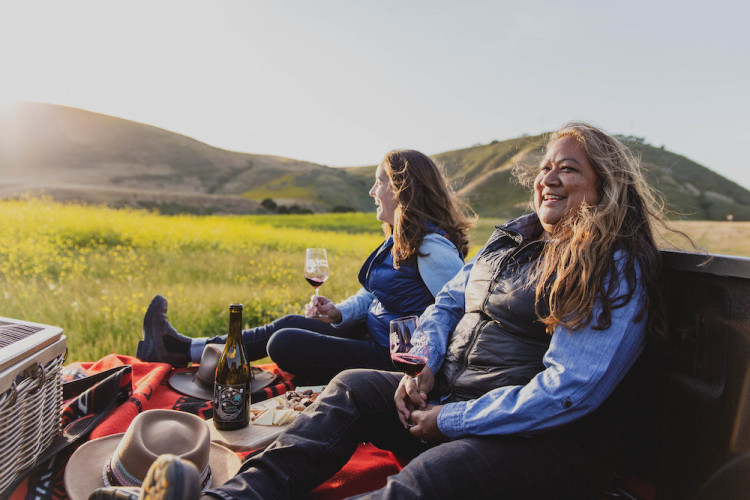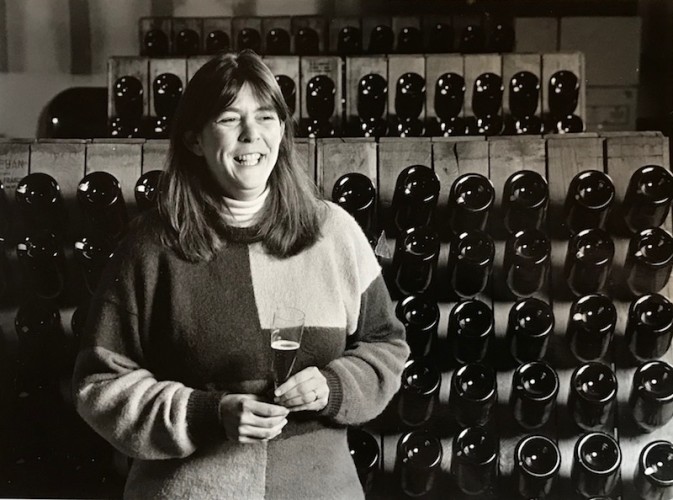Meet the Maker
Terah Wine Co: One natural-born winemaker, two crazy-amazing natural wines.
It’s our most natural partnership yet. Terah Bajjalieh from Terah Wine Co. is making space for women in male-dominated space, and putting natty wine on the map in a major way.

By Maker Wine
April 08, 2024
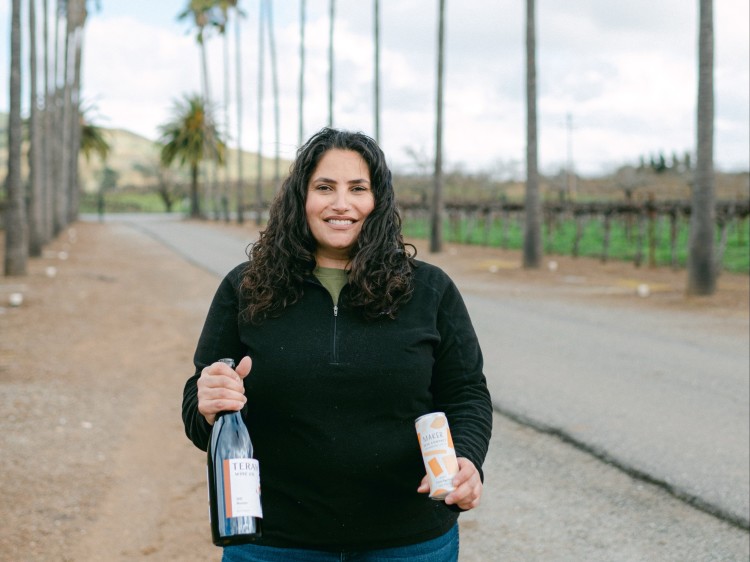
Natural wines are causing quite the buzz these days. You’ve probably seen them creeping onto restaurant menus, being upsold at your local wine bar, or aggressively flaunted at that edgy hipster we actually don’t serve cocktails popup.
But what does it actually mean?
High-level, natural wine is made from grapes that are often organically or biodynamically farmed with minimal intervention in the winemaking process, including no – or extremely limited use of – additives or sulfites. The goal for many natural winemakers is to produce a wine that expresses the unique characteristics of the grapes and the terroir in which they were grown – which is true for Terah Bajjalieh from Terah Wine Co. (If you’re looking to deep dive, you can read all about Natty Wines in our blog post breakdown).
We sat down with Terah to talk about winemaking, women in the industry, and her two wines we recently canned: a skin-contact Orange Vermentino and Chillable Red, a carbonic Sangiovese. Spoiler alert: we’re obsessed.
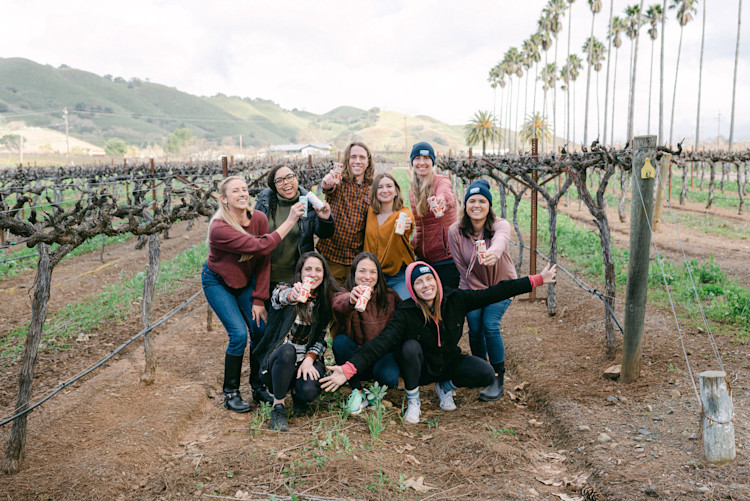
Maker Wine Team at Terah's canning | Photo by Alison Rae Photography
Where there’s wine and food, there’s also Terah
Bay Area native and natural winemaker Terah Bajjalieh discovered her passion for wine through her love of food. She always had a thing for cooking, culinary shows, and checking out new and noteworthy restaurants popping up on the scene.
After graduating with a BS in Finance from San Jose State University, she enrolled in an affordable sommelier course in San Jose as a more accessible alternative to culinary school. She realized she could still experience what she loved about food, travel, and culture, through another medium she could be equally passionate about: wine.
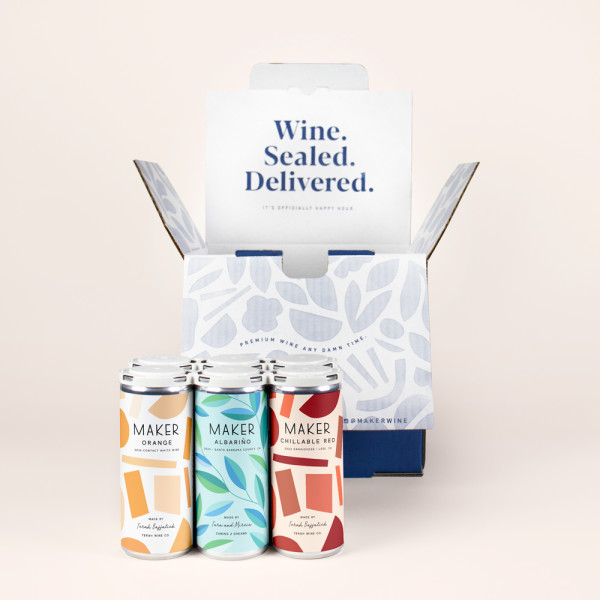
Try our natural wines
Try members-only Albariño, Orange Vermentino, and Carbonic Sangiovese – three very natty, #nofilter kind of wines from independent female winemakers.
After a stint in hospitality –where she focused on sales and marketing with master sommeliers in the Bay Area – she made her way to Argentina to work harvests and gain more experience as a somm.
In Argentina, Terah spent her time harvest hopping and connecting with other passionate people who shared similar interests. After several harvests, she realized what she loved most was getting her hands dirty in every part of the winemaking process. She found her happy place was in the field, rather than front-of-house.
After five years, she decided to make wine long-term, and she enrolled in Montpellier SupAgro’s graduate program to study winemaking.
And deeper into the world of wine she went (quite literally)
Terah immersed herself in the international world of wine, studying Enology and Viticulture in Spain and France. Her six years of vintage hopping (and living out of a suitcase) saw her complete 13 harvests covering five countries, including France, Australia, and New Zealand – sometimes doing three harvests in a year.
Terah’s travels were a meaningful way to see the world while doing something she loved, all while teaching her what she liked and didn’t like about wine and the winemaking process.
Her work with large-scale producers showed her she didn’t like an environment where wines had to taste the same from vintage to vintage for production’s sake. Instead, she gravitated towards the allure of Old World wines and a more nuanced approach, focusing on the macro elements of winemaking while creating a harmonious balance between techniques and microclimate qualities.
COVID, garage wine, and the birth of Terah Wine Co.
Returning from Europe, Terah scored a management role for a wine company in Monterey County, California. After a year and a half in Monterey, Terah moved up to Santa Clara County. Soon after, COVID hit and Terah lost her job.
She had always toyed with the idea of starting her own wine project, but had never taken the leap. Just the year before, she had made a barrel of wine in her friends’ garage, going old school in production with just buckets and her hands. And they loved it. She thought, maybe now was the time to take her shot.
After tossing the idea around in her head for a while, Terah decided to pitch it to her friends. Their answer was simple: she had to do it.
Terah laughs and says their enthusiasm propelled things along a little faster than she expected. But that’s when Terah Wine Co. was born – with zero funding and loads of moral support.
After wrapping her marketing, website development, label designing, and licensing, Terah was finally ready to produce her first vintage. She decided to go old-school again, getting permits for her friends’ garage and putting up a temporary wall to make her workspace.
She made 120 cases that first year of running Terah Wine Co.
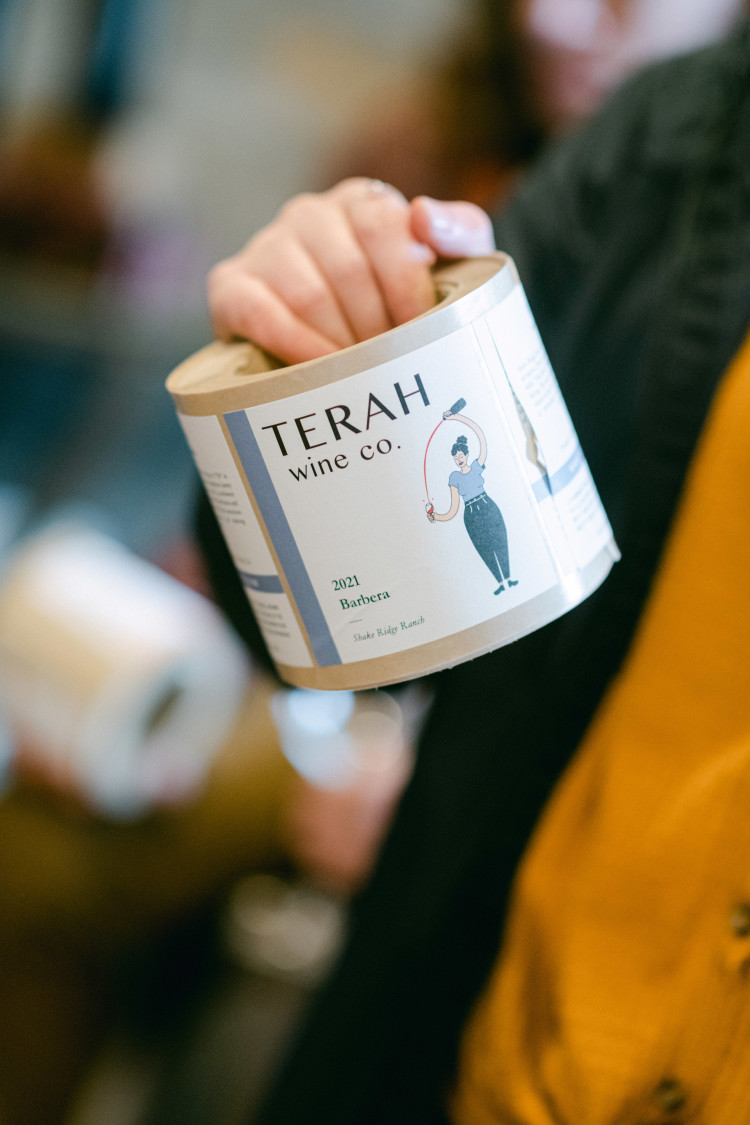
Terah Wine Co. bottle labels | Photo by Alison Rae Photography
Looking back on the success of her first vintage, Terah notes that her support system made a huge impact on her production. It was a heartfelt start shared with friends who were more like family. Friends who contributed financially, and also worked right next to her to pick grapes and help with production.
And, while 120 cases may not sound like a lot, it was enough to show the world what Terah was doing and get the ball rolling.
With a small yield from a self-funded project, Terah couldn’t afford to jump all in and make wine full time. But in 2021, she joined the team at Dorcich Family Vineyards as their head winemaker. She was able to switch production to their winery and get better access to equipment and assistance – and has since increased production of her own wine gradually.
The product is greater than the sum of its parts
Terah's approach to winemaking centers on finding unique microclimates and vineyard sites that can showcase outstanding varietal typicity and produce expressive, structured, balanced wine. She believes that the quality of grapes and the quality of farming has a tremendous impact on the final product, which is why she looks at her growers as invaluable partners in a serious long term relationship.
Unlike other winemakers, Terah's MO is to create wines that perfectly complement food. She strives for those bursts of acidity, aromatics, and expression that evoke complex and surprising emotions in drinkers, and wants her wines to engage all the senses –from the texture on the tongue to the aroma and color of the wine.
Being a woman in wine
These days it’s kind of a hot topic, and Terah acknowledges the challenges that come with being a woman – and minority – in the industry. Of course, she’s experienced great things in the wine world. But women have to pave their own paths because there are so few of them, and many – especially those who don’t come from wealth or do come from minority backgrounds – lack connections and opportunities.
They’re often underestimated too. While the physical aspect of winemaking is strenuous and physically tolling, Terah’s able to do the work – sometimes better than men. She says women often have to prove themselves in this aspect, as physical strength is not assumed at first glance.
Through her projects, Terah hopes to highlight all the different strengths that women bring to wine, and to raise awareness of their minority status in the industry. We’ll raise a glass to that.
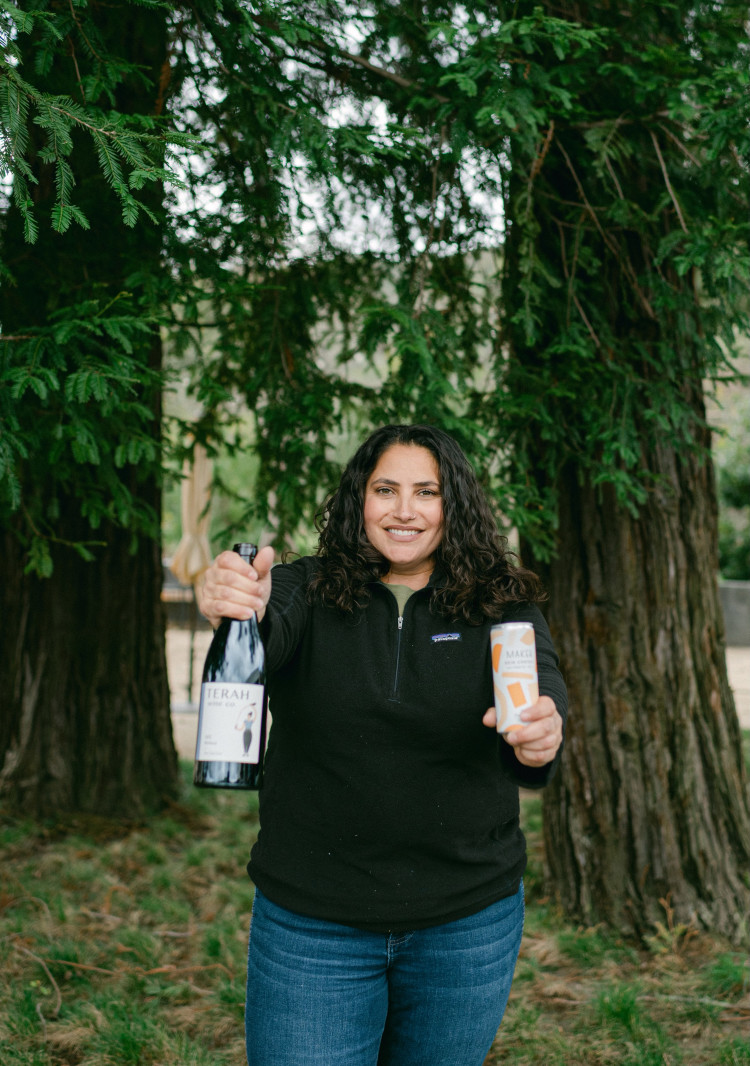
Terah holding a can of orange on canning day. Photo credit: Alison Rae Photography.
And now, meet our first-ever skin contact wine: Orange Vermentino
For those who don’t know, orange wine is made with white grapes undergoing the same processes used to make red wine – either with stems as a whole cluster or destemmed, then fermented with skins on which influences the gorgeous terracotta hue. It’s more structured than white wine due to the style of fermentation and has a more interesting nose.
"What that skin contact does is provide more tannin and texture, and it definitely lifts the aromatic complexity of most orange wines." - Terah
Terah’s Orange Vermentino is the perfect portrayal of the process.
Hailing from Clements Hills in Lodi CA, the grapes were biodynamically farmed (huge W in the natural wine world) before being fermented on skins with stems as a whole cluster. Terah then pressed and fermented a small portion as straight Vermentino, before blending a bit of that portion back into the orange wine.
The result? An easy-to-drink, easier-to-love gateway wine for white wine drinkers who “don’t like red” to dip their toes in with a softer approach. It’s aromatic without being too weighted by tannins, and it makes for a great stand-alone sipper or dinnertime staple.
While Vermentino grapes tend to lean toward the savory side, Lodi’s warmer climate coupled with the cool Pacific Ocean breeze brings out herby aromatics and a coastal minerality. This makes Terah’s Vermentino food’s best friend – pairing well with pretty much everything, but *particularly well* with Thai dishes, fall salads, Vietnamese noodles, and anything minty or cilantro-friendly.
Shop our Orange Vermentino
Orange Wine (Skin-Contact Vermentino)
Terah Wine Co., Lodi, CA
Thyme, lemongrass, citrus, and Pacific Ocean minerality – a very refreshing orange wine.
Carbonic wine 101: About Terah's Chillable Red
So, what the eff is a carbonic wine?
Carbonic wine is made using a winemaking technique called carbonic maceration. During carbonic maceration, grapes are placed in a sealed container with carbon dioxide, which causes the grapes to ferment inside their own skins rather than through the traditional method of crushing and adding yeast. As the grapes ferment, they release their own natural sugars and enzymes, eventually causing the grapes to burst and release their juice instead of forcing extraction.
Carbonic wines tend to be softer, more delicate, easy drinkers that are lighter in color, lower in tannins, have a fruity, floral aroma, and a fresh, lively taste. Terah chose to use Sangiovese grapes because they’re typically super cherried, fruit-forward, and are a great expression of the carbonic process, which amplifies the fruity flavors while still supporting the aromatic components.
And, to get a tad technical, Sangiovese grapes generally have a low pH and fermenting with stems automatically raises the pH. So, Terah knew it made sense from a science perspective too.
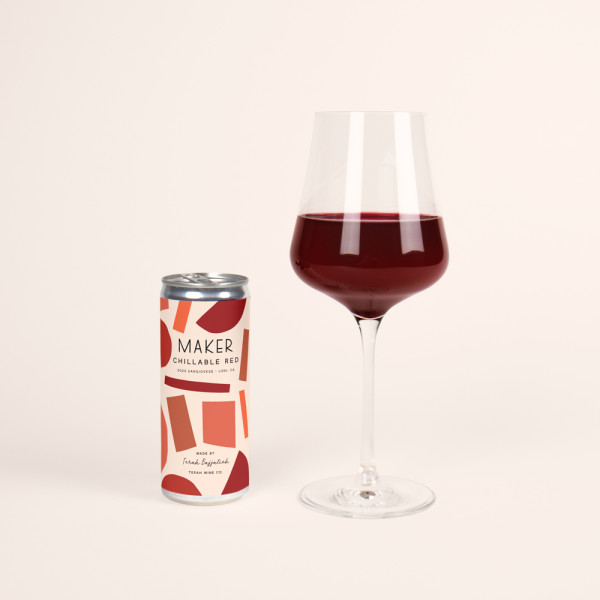
Try Carbonic Sangiovese
Strawberry, cherry, and something rustic and reminiscent of the Italian countryside. This natural red by Terah Wine Co. is light, juicy, and so good with food.
The grapes for Terah’s Chillable Red are from two biodynamically farmed vineyards in Lodi – one that is newly grafted, the other older vines.
"Even though it's inland and thought to be a warmer climate, Lodi gets a lot of Pacific Ocean influence making it a cooler site for California. This is important for winemaking – for me stylistically – because I want to make wines with balanced alcohol and maintain lower pH." - Terah
As a result, the final product strikes the perfect balance in flavor profile. While carbonic wines are fruit-forward, this Carbonic Sangiovese brings in notes of anise and pepper to round out the fine fruitiness, giving the wine depth and complementary savory qualities.
It’s ideal for a day in the sun with a slight chill, or for warmer golden hour vibes. Pair it with pizza, BBQ, or dishes with a light smokiness, like pasta with bacon and cream sauce.
Want to go natural? You can shop both of Terah Wine Co.'s natty standouts when you join the Can Club. Before you crack the can, turn it over and take a look at the secret message Terah printed to thank the friends that let her use their garage to make her first wines.
Already a part of the Club? Get both wines (plus, Albariño) in our Natty Wines Mixed Pack.

Try our natural wines
Try members-only Albariño, Orange Vermentino, and Carbonic Sangiovese – three very natty, #nofilter kind of wines from independent female winemakers.
